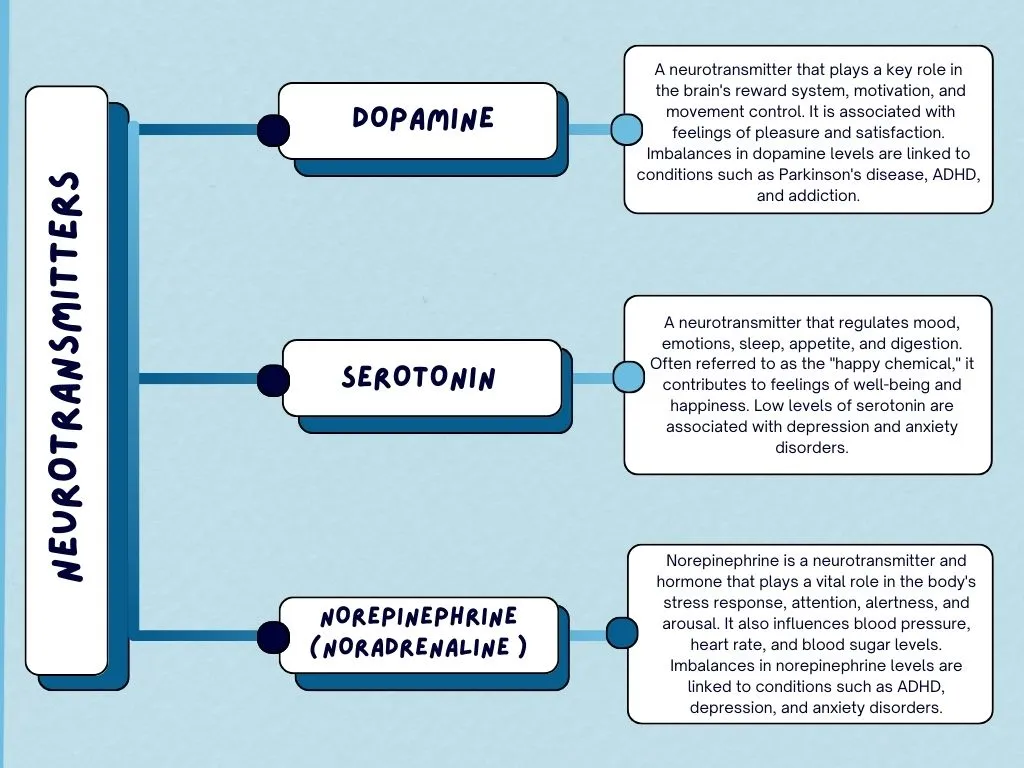Drugs change the writing of neurotransmitters in your brain, which can lead to aggression or mood swings.
These affected neurotransmitters, such as GABA, dopamine, and norepinephrine, will cause drug-dependent individuals to be more aggressive than usual because of how the drug’s ingredients interact with their brains.
This article discusses how drugs and violence go hand in hand and how their ingredients alter your mood and thinking patterns.
The Neurobiology of Violence and Drugs
The intricate link between substance abuse and violent behavior is rooted in the complex neurobiology of the human brain. When an individual consumes certain drugs, it can lead to profound alterations in their brain function, ultimately influencing their thoughts, emotions, and actions.
Neurotransmitter Imbalances
Drugs can disrupt the delicate balance of neurotransmitters, the chemical messengers responsible for relaying signals between nerve cells in the brain. These substances can interfere with neurotransmitter function in various ways, such as:
- Increasing the production of specific neurotransmitters
- Blocking the reception of neurotransmitters
- Mimicking the effects of certain neurotransmitters
Imbalances in key neurotransmitters like dopamine, serotonin, and norepinephrine, which play vital roles in regulating mood and behavior, can contribute to heightened aggression and violent tendencies.
Altered Brain Function
When an individual consumes drugs, the chemical changes in their brain can lead to significant alterations in their thoughts, perceptions, and emotional responses. These changes can manifest as:
- Impaired judgment and decision-making skills
- Increased impulsivity and risk-taking behavior
- Heightened emotional reactivity and sensitivity
- Distorted perceptions of reality and paranoia
These drug-induced alterations in brain function can create a volatile emotional state that increases the likelihood of aggressive or violent behavior, even in individuals who may not exhibit such tendencies when sober.
It’s essential to recognize that the relationship between drugs and violence is complex and multifaceted, influenced by a combination of biological, psychological, and environmental factors. However, understanding the neurobiology behind this connection can help us develop more effective prevention, intervention, and treatment strategies.

What Are the Signs That Drugs Are Making Someone Violent?
Recognizing the warning signs that drugs are contributing to violent behavior is crucial for ensuring the safety of both the individual and those around them. While every person’s experience with substance abuse is unique, there are several common indicators that drugs may be fueling aggressive tendencies.
Mood Swings and Emotional Instability
Other Warning Signs
Several other red flags may indicate drugs are contributing to violent behavior:
- Youth and males are at a higher risk of drug-related aggression
- Minor incidents, such as misunderstandings or changes in plans, trigger disproportionate anger and frustration
- The individual experiences high levels of anxiety or agitation, even in unrelated situations
- Depressive symptoms are accompanied by bouts of anger or rage
- Lowered inhibitions lead to increased sociability, followed by sudden mood shifts
If you notice these signs in a loved one or someone close to you, it’s essential to approach the situation with care and compassion. Seeking professional help from addiction specialists and mental health professionals can provide the necessary support and guidance to address drug-related violence and work towards a path of recovery and healing.
Understanding the Link Between Drugs and Violence

Understand that not everyone who uses these substances will become aggressive; certain drugs have been linked to an increased risk of violent behavior. The anger and aggression induced by these drugs can be categorized into two main types: predatory and impulsive.
Predatory Aggression
Predatory aggression involves a calculated and premeditated approach to causing harm. This type of behavior may manifest as:
- Stalking another individual or animal with the intent to scare, assault, or kill
- Carefully planning and executing violent acts
- Displaying a lack of empathy or remorse for the harm caused
Drugs that have been associated with predatory aggression include:
- Cocaine
- Methamphetamine
- Anabolic steroids
Impulsive Aggression
In contrast to predatory aggression, impulsive aggression is characterized by sudden, unplanned outbursts of anger or violence in situations that do not warrant such an intense reaction. This type of behavior may involve:
- Yelling or screaming at others
- Belittling or insulting individuals
- Invading personal space in an attempt to intimidate or emphasize a point
- Engaging in physical altercations without premeditation
Drugs that have been linked to impulsive aggression include:
- Alcohol
- Benzodiazepines
- Synthetic cathinone (bath salts)
It’s important to remember that the relationship between drugs and violence is complex, and not everyone who uses these substances will exhibit aggressive behavior. However, understanding the potential risks associated with certain medications can help individuals make informed decisions about their health and well-being and seek help when necessary.
An In-depth Look at Each Drug
Methamphetamine
Methamphetamine, or meth, can cause a phenomenon known as “meth rage.” Regular meth use lowers inhibitions, leading individuals to engage in behaviors they might not normally consider. For those with pre-existing anger issues or mental health conditions like depression, meth rage can be even more severe.
Meth-dependent individuals often have a singular focus: obtaining their next hit. This fixation can lead to aggressive behavior towards anyone or anything perceived as a threat to securing more of the drug. Meth use also disrupts the balance of subcortical systems, making users more likely to act impulsively without considering the consequences.
It’s important to note that meth does not directly cause violence in all users. Factors such as environment, cravings, paranoia, and anxiety can trigger violent behavior. Meth alters memory patterns and emotional responses, making it more difficult to regulate emotions and increasing the likelihood of aggressive reactions in various situations.
A 2010 study found that long-term meth use can lead to a diminished inferior frontal gyrus, a part of the prefrontal cortex responsible for impulse control. As a result, meth-dependent individuals may be more prone to responding aggressively compared to non-users.
Cocaine
Cocaine, a stimulant drug, can also contribute to violent behavior. While the initial euphoric high may feel enjoyable, long-term cocaine dependence has serious consequences. Crack cocaine, which is inhaled, has a more intense and faster-acting effect than snorted cocaine hydrochloride, but the euphoria is shorter-lived, and the aftermath feels more intense.
Unlike alcohol, cocaine increases anxiety, paranoia, and sometimes even extreme happiness, which can later turn into anger or depression. Cocaine users may become suspicious and develop irrational conspiracy theories, leading to aggressive and erratic behavior.
As the brain becomes accustomed to cocaine, users often require higher doses to achieve the same euphoric effect. This increased dosage can lead to accidental overdose and other health issues,
- Heart issues.
- Stomach conditions.
- Lung problems.
- Contracting HIV or Hepatitis if you inject cocaine with used needles.
- Mood swings.
- Libido problems.
- Seizures.
Alcohol
Although alcohol is a beverage, it has damaging effects similar to pills and drugs. As a depressant, alcohol affects the brain and motor responses, impairing impulse control and the ability to process information. The cerebral cortex, responsible for interpreting new information, is particularly affected by alcohol, leading to misjudgments and inappropriate reactions.
Men are more likely than women to become violent when under the influence of alcohol, putting women at a higher risk of harm. Approximately 70% of alcohol-related violent acts occur within the home, with around 20% involving weapons beyond hands, fists, or feet. It’s estimated that strangers are the victims of about 1.4 million alcohol-associated violent incidents each year.
Anabolic Steroids and Aggression
Anabolic steroids contain synthetic testosterone, which mimics the effects of the natural hormone in the body. While prescribed for conditions such as delayed puberty and muscle loss, bodybuilders sometimes misuse these steroids to enhance performance and gain muscle mass more quickly.
Bodybuilders who take high doses of anabolic steroids are at a higher risk of developing dependence, as their bodies rely on the drugs for function and performance. Withdrawal symptoms can include appetite loss, restlessness, mood swings, and cravings for more steroids. The restlessness associated with withdrawal or high-dose use can manifest as aggression.
Like other anger-inducing drugs, anabolic steroids interfere with neurotransmitters responsible for impulse control, making users more prone to aggressive behavior toward others.
💡
Anabolic Steroids: Fueling Aggression and Violence
Anabolic steroids, which are synthetic substances that mimic the effects of testosterone, have been linked to increased aggression and violent behavior. These drugs can alter brain chemistry, particularly in the regions responsible for regulating mood and impulse control. Steroid users may experience extreme mood swings, irritability, and a heightened sense of invincibility, which can lead to aggressive outbursts and violent confrontations. The abuse of anabolic steroids has been associated with incidents of domestic violence, assault, and even homicide, highlighting the dangerous consequences of these substances on behavior and mental health.
Opioids
Opioids can cause violent outbursts, particularly during the withdrawal process. These drugs interact with dopamine levels, and the body develops a dependence with continued use. The heightened dopamine levels can lead to regular aggression.
When opioid-dependent individuals are unable to obtain the drug, they may experience intense anxiety and cravings, focusing solely on securing more opioids to maintain their “feel-good” reward system. These irregularly high dopamine levels can also lead to dishonesty and strained relationships with family, friends, and co-workers, as the individual may lie about their dependence or engage in other deceptive behaviors to obtain more opioids.
Hallucinogens
Hallucinogens are psychoactive drugs that can induce a psychedelic state and potentially trigger aggressive behavior. When under the influence of hallucinogens, individuals may feel detached from reality, experiencing altered states of consciousness that can distort their thoughts and feelings.
The two main types of hallucinogens are PCP and LSD, both of which can act as either anesthetics, stimulants, or depressants, depending on the dosage.
PCP
Phenylcyclohexyl piperidine, or phencyclidine (PCP), is a dissociative hallucinogen that can induce violence and distort an individual’s perception of reality. PCP interacts with neurotransmitters responsible for emotion regulation, making it difficult for users to control their feelings and potentially leading to aggressive outbursts toward others.
As a Schedule II substance, PCP withdrawal can cause depression, anxiety, and aggression. Current studies have linked PCP use to predominantly violent and aggressive actions, including self-harm and severe criminal activities such as assaults and homicide. This connection may stem from combining the drug’s immediate and long-term effects.
LSD
Lysergic acid diethylamide (LSD), also known as LAD, LSD-25, or acid, is a Schedule I substance that can cause visual and auditory hallucinations. Like MDMA and heroin, LSD is considered to have no actual medical need and carries a high risk of abuse.
Some individuals may turn to LSD as a means of escaping reality or temporarily forgetting their responsibilities and worries. However, long-term LSD use can have serious consequences, including seizures, compromised heartbeat, difficulty with coordination, restlessness, and fluctuations in blood pressure.
Prescription Medications
While prescription medications are intended to improve health, they can sometimes lead to adverse side effects, such as increased aggression or violent tendencies in specific individuals. Changes in brain chemistry, hormonal imbalances, or disruptions to mood-regulating neurotransmitters may cause these behaviors.
For example, some antidepressants, particularly Selective Serotonin Reuptake Inhibitors (SSRIs) that affect serotonin levels, have been linked to a higher risk of aggressive behavior in rare cases. Similarly, drugs like Chantix, used for smoking cessation, can cause mood swings and violent urges.
Benzodiazepines, commonly prescribed for anxiety, can also trigger sudden outbursts of aggression if misused or abused. It’s crucial to note that while these side effects are possible, not everyone who takes these medications will experience them.
When starting a new medication, it’s always important to discuss potential side effects with a healthcare provider and monitor any changes in behavior closely. By staying informed and vigilant, individuals can work with their healthcare team to find the most appropriate treatment options while minimizing the risk of adverse side effects like increased aggression or violent tendencies.
Factors that Enhance the Link between Drugs and Violence
While drug use alone can increase the risk of violent behavior, it’s the combination of various factors that can further magnify this risk. These factors include polysubstance use, pre-existing mental health conditions, environmental influences, and the challenges of withdrawal and dependence.
Polysubstance Use
Polysubstance use, or the concurrent use of multiple drugs, can intensify the negative effects of each substance, leading to unpredictable and potentially aggressive behavior. Mixing depressants and stimulants, such as alcohol and cocaine, can offset their effects, prompting users to consume more and increasing the likelihood of violent outbursts or paranoia.
Pre-Existing Mental Health Conditions
For individuals with pre-existing mental health disorders, drug use can exacerbate their symptoms, mainly if they are untreated or unaware of their condition. For example, someone with an underlying mood disorder may experience severe mood swings when using narcotics, potentially triggering violent tendencies or aggressive behavior.
Environmental Factors
The environment in which drugs are consumed plays a significant role in influencing behavior. Users in hostile or unstable environments may be more prone to violence compared to those in safer, more controlled settings. Peer influences, such as encouragement of aggressive behaviors or contentious drug-taking settings, can also increase the likelihood of violent outbursts.
Additionally, socio-economic factors like poverty and lack of access to resources can intertwine with drug use, intensifying feelings of frustration and leading to aggression.
Withdrawal and Dependence
Dependence on drugs and the subsequent withdrawal process can be physically and mentally taxing. As the body becomes reliant on a substance, its absence can lead to severe withdrawal symptoms, including irritability, anxiety, and agitation. These symptoms can escalate to violent behaviors if not adequately addressed, especially when individuals attempt to quit without proper medical supervision.
Methamphetamine can cause a phenomenon known as “meth rage,” characterized by sudden outbursts of aggression and violence. This drug alters the brain’s chemistry, affecting neurotransmitters regulating mood and behavior. Individuals under the influence of meth may exhibit unpredictable and violent behavior, even towards loved ones.
Cocaine use can lead to intense feelings of paranoia, causing users to become suspicious and distrustful of others. This heightened state of paranoia can trigger aggressive responses to perceived threats, even when no real danger exists. The combination of increased energy and paranoid thoughts can result in violent outbursts.
Alcohol is a depressant that lowers inhibitions and impairs judgment, making some individuals more prone to aggressive behavior. Consuming alcohol can lead to heightened emotional responses, including anger and frustration. Under the influence of alcohol, people may engage in violent acts, such as physical fights or domestic abuse, that they might not otherwise commit when sober.
Counter Arguments and Misconceptions
It’s important to address common misunderstandings regarding the connection between drugs and violence to foster a more informed and compassionate approach to this complex issue.
Firstly, not all drug users exhibit violent behavior. The effects of drugs can vary significantly based on individual factors such as physical and mental health, as well as the context in which the drug is used.
Secondly, violence is a multifaceted problem influenced by various factors beyond drug use, including socioeconomic conditions, upbringing, personal traumas, and peer pressure. Attributing violent tendencies solely to drug use oversimplifies a complex issue.
Lastly, perpetuating the belief that drug use inevitably leads to violence can stigmatize drug users, making it more difficult for them to seek help or rehabilitation. It is crucial to approach this topic with nuance and compassion to promote understanding and effective solutions.
By recognizing the complex interplay of factors that contribute to the link between drugs and violence, we can work towards developing more comprehensive and effective strategies for prevention, treatment, and support for those struggling with substance abuse and aggressive behaviors.
What if Drugs Are Making Me Violent?
If you find yourself using drugs that are known to induce violence and notice that you are repeatedly engaging in aggressive behavior towards others, it’s crucial to seek help immediately. Recognizing that you are not acting like yourself and need assistance to turn your life around is a significant first step in the right direction.
At our treatment center, we are here to support you whenever you need us. Our representatives are available 24/7 to answer your questions about our programs, insurance coverage, amenities, and more. Don’t hesitate to give us a call or send a text, whichever mode of contact you prefer.
As you begin your journey towards seeking help, here are some do’s and don’ts to keep in mind:
DO:
- Decide to get help.
- Call a drug and alcohol treatment center to get help.
- Give yourself grace through the process.
- Try to give yourself positive affirmations even if all seems hopeless.
- Call or text our facility when you feel ready.
- Have someone (or yourself) bring you to the facility when prepared.
- Find a hobby or an activity that calms you down so you can relax as you seek help.
DON'T:
- Wait until you seriously harm someone or face legal consequences before getting help
- Resist the recovery process
What If Someone I Love Is Using Drugs and Being Violent?
Get Help for Addiction at Cornerstone
If you have a loved one who is being violent due to drug use, don't hesitate to contact us on our call/text line.
While you cannot force your loved one into seeking treatment, even when you know they desperately need it, we can explore other options, such as intervention.
If you’re struggling to take the first steps in discussing addiction treatment, reach out to us for guidance. When encouraging your loved one to seek medical help, consider these do’s and don’ts:
DO:
- In situations of extreme violence, where your life has been threatened, reach out to a professional to create a plan to leave or have your loved one removed from your home.
- Establish strong boundaries.
- Involve another friend or family member to protect you from further acts of violence.
- Bring in a professional to talk to your loved one about getting help for their addiction.
DON'T:
- Enable them because you are afraid.
- Stay in the same house if you fear for your life.
- Hope that they will get sober on their own (people rarely do without professional or legal intervention)
- Act aggressively with them as it can trigger the same behavior from them.
Remember, you are not alone in this challenging situation. Our team is here to provide the support and resources you need to help your loved one overcome their addiction and violent tendencies. Together, we can work towards a healthier, safer future for all involved.
Key takeaways 📝
- Certain drugs can alter brain chemistry, affecting neurotransmitters like dopamine, serotonin, and norepinephrine, essential in regulating mood, behavior, and impulse control. These chemical imbalances can increase the likelihood of aggressive or violent behavior.
- Drugs such as methamphetamine, cocaine, and alcohol are particularly notorious for their potential to trigger violent outbursts. Meth rage, cocaine-induced paranoia, and alcohol-fueled aggression are well-documented phenomena that highlight the dangerous interplay between substance abuse and violence.
- While not everyone who uses drugs will become violent, it's essential to recognize the potential risks and seek help if you or someone you know is struggling with substance abuse. Addressing addiction through professional treatment and support can help prevent the devastating consequences of drug-related violence.





